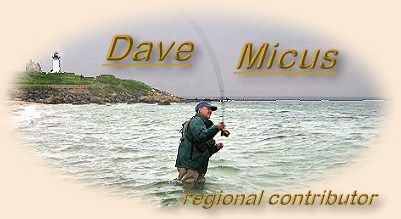|
"It is not flyfishing if you are not looking for
answers to questions," wrote Norman Maclean, but
I'm not sure I agree. I think the questions and
(occasionally) the answers come without the flyfisher
looking. We are granted epiphanies inadvertently
while enjoying that most elusive commodity, solitude.
I recently delved into the psyche of fiction's most
famous fisherman, though my quest was for striped bass,
not literary insights.
I was fishing the mouth of the river on an incoming
tide, and hadn't been long out when I hooked a large
striper, the largest I ever hooked. When he felt the
hook he ran straight out to sea. I did the only thing
I could; palmed the reel and hung on. Finally he stopped.
I tried to regain line, but the fish would not budge.
The pressure I exerted made him run again, but,
fortunately, this run was toward and parallel to
the shore. I half-ran half-stumbled toward him,
regaining line as I went. I could see his dorsal
and tail fins protruding from the water. This was
a very big fish.
Then, like a bad relationship, the tension that
bound us together was gone. Further elaboration
is unnecessary; an angler knows how I felt, a
non-angler never will. And suddenly I began to
understand Ahab.
Flyfishing literature is replete with descriptions
of the one that got away. "We forget most of the
disagreeable or unpleasant incidents attending our
sport, but we never forget the big fish we have lost,"
wrote the father of American flyfishing, Theodore
Gordon, 92 years ago. Novelist Thomas McGuane is a
bit more erudite: "It [the lost fish] joined that
throng of shadows, touched and unseen, that haunt
the angler--fish felt and lost, big ones that got
away that are the subject of levity to nonanglers
but of a deeper emotion to the angler himself."
Norman Maclean explains it best: "No one can tell
what a spot of time is until suddenly the whole
world is a fish and that fish is gone. I shall
remember that son of a bitch forever!"
Now compare these to Ahab's description of Moby Dick:
"It was that accursed white whale that razeed me.
I'll ten times girdle the unmeasured globe; yea
and dive straight through it, but I'll slay him yet!"
Nomenclature aside, are his exhortations so different?
Ahab is obsessed with the one that got away.
Why are we haunted by lost fish? Primitive hunters,
according to Joseph Campbell, believed that you only
captured game you were worthy of capturing, and this
primal belief still resonates in we sportsmen. Every
lost fish swims away with a piece of our worthiness,
just as Moby Dick swam away with Ahab's leg--the
larger the fish, the larger the piece.
So forget about good v. evil, or reach v. gasp, or any
of those other theories so solemnly expounded by your
high school lit teacher; Ahab is an angler who is pursuing
the big one that got away.
Given the same opportunity, every fisherman I know
would do exactly the same.
~ Dave
About Dave:
 Dave Micus lives in Ipswich, Massachusetts. He is an
avid striped bass fly fisherman, writer and instructor.
He writes a fly fishing column for the Port City Planet
newspaper of Newburyport, MA (home of Plum Island and Joppa Flats)
and teaches a fly fishing course at Boston University.
Dave Micus lives in Ipswich, Massachusetts. He is an
avid striped bass fly fisherman, writer and instructor.
He writes a fly fishing column for the Port City Planet
newspaper of Newburyport, MA (home of Plum Island and Joppa Flats)
and teaches a fly fishing course at Boston University.
|

 Dave Micus lives in Ipswich, Massachusetts. He is an
avid striped bass fly fisherman, writer and instructor.
He writes a fly fishing column for the Port City Planet
newspaper of Newburyport, MA (home of Plum Island and Joppa Flats)
and teaches a fly fishing course at Boston University.
Dave Micus lives in Ipswich, Massachusetts. He is an
avid striped bass fly fisherman, writer and instructor.
He writes a fly fishing column for the Port City Planet
newspaper of Newburyport, MA (home of Plum Island and Joppa Flats)
and teaches a fly fishing course at Boston University.